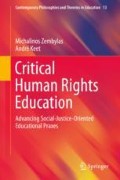Abstract
This chapter takes up Foucault’s politics of human rights and suggests that it may contribute to the renewal of HRE not only because it rejects the moral superiority of humanism—the grounding for the dominant liberal framework of international human rights—but also because it makes visible the complexities of human rights as illimitable and as strategic tools for new political struggles. Enriching human rights critiques has important implications for HRE, precisely because these critiques prevent the dominance of unreflexive and unproductive forms of HRE that lead toward a declarationalist, conservative and uncritical approach. It is argued that Foucault’s critical affirmation of human rights—that is, an approach which is neither a full embrace nor a total rejection—provides a critique that can be disruptive to the conventional HRE approach and creates openings that might renew HRE, both politically and pedagogically.
Access this chapter
Tax calculation will be finalised at checkout
Purchases are for personal use only
References
Adami, R. (2014). Rethinking relations in human rights education: The politics of narratives. Journal of Philosophy of Education, 48(2), 293–307.
Al-Daraweesh, F. (2013). Human rights and human rights education: Beyond the conventional approach. In Factis Pax, 7(1), 38–58.
Al-Daraweesh, F., & Snauwaert, D. (2013). Toward a hermeneutical theory of international human rights education. Educational Theory, 63(4), 389–411.
Barret-Kriegel, B. (1992). Michel Foucault and the police state. In T. J. Armstrong (Ed.), Michel Foucault: Philosopher (pp. 92–98). London: Harvester Wheatsheaf.
Baxi, U. (1997). The promise of the third millennium. In G. Andreopoulos & R. Claude (Eds.), Human rights education for the 21st century (pp. 142–154). Philadelphia: University of Pennsylvania Press.
Baxi, U. (2007). Human rights in a posthuman world. New Delhi, India: Oxford University Press.
Blasius, M. (1994). Gay and lesbian politics: Sexuality and the emergence of a new ethic. Philadelphia, PA: Temple University Press.
Brown, W. (1995). States of injury: Power and freedom in late modernity. Princeton, NJ: Princeton University Press.
Brown, W. (2004). “The most we can hope for”: Human rights and the politics of fatalism. The South Atlantic Quarterly, 103(2/3), 451–463.
Foucault, M. (1980). In C. Gordon (Ed.), Power/knowledge: Selected interviews and other writings (1972–77). New York: Pantheon Press.
Foucault, M. (1983a). The subject and power. In H. Dreyfus & P. Rabinow (Eds.), Michel Foucault: Beyond structuralism and hermeneutics (pp. 208–226). Chicago: University of Chicago Press.
Foucault, M. (1983b). On the genealogy of ethics. In H. Dreyfus & P. Rabinow (Eds.), Michel Foucault: Beyond structuralism and hermeneutics (pp. 229–252). Chicago: University of Chicago Press.
Foucault, M. (1991). Discipline and punish: The birth of the prison. (A. Sheridan, Trans.). Harmondsworth, UK: Penguin.
Foucault, M. (1997). The social triumph of the sexual will. In P. Rabinow (Ed.), Essential works of Foucault 1954–1984 (Ethics, Subjectivity and Truth) (Vol. 1, pp. 157–162). Harmondsworth, UK: Penguin.
Foucault, M. (2000). The moral and social experience of the poles can no longer be obliterated. In J. Faubion (Ed.), Power. Essential works of Foucault 1954–1984 (Vol. 3, pp. 465–473). New York: The New Press.
Foucault, M. (2003). Society must be defended: Lectures at the Collège de France 1975–76. (D. Macey, Trans.). London: Allen Lane.
Golder, B. (2010a). Foucault and the unfinished human of rights. Law, Culture and the Humanities, 6(3), 354–374.
Golder, B. (2010b). What is an anti-humanist human right? Social Identities, 16(5), 651–668.
Golder, B. (2011). Foucault’s critical (yet ambivalent) affirmation: Three figures of rights. Social & Legal Studies, 20(3), 283–312.
Golder, B. (2013). Foucault, rights and freedom. International Journal for the Semiotics of Law, 26(1), 5–21.
Gordon, C. (1994). Introduction. In J. Faubion (Ed.), Power. Essential works of Foucault 1954–1984 (Vol. 3, pp. xi–xli). New York: The New Press.
Hopgood, S. (2013). The endtimes of human rights. Ithaca, NY: Cornell University Press.
Hunt, L. (2004). The 18th century body and the origins of human rights. Diogenes, 51(3), 41–56.
Keet, A. (2010). Human rights education: A conceptual analysis. Saarbrücken, Germany: Lambert Publishers.
Keet, A. (2012). Discourse, betrayal, critique: The renewal of human rights education. In C. Roux (Ed.), Safe spaces: Human rights education in diverse contexts (pp. 7–27). Rotterdam, The Netherlands: Sense Publishers.
Knowles, D. R. (2003). Political philosophy. In J. Shand (Ed.), Fundamentals of philosophy (pp. 326–350). London: Routledge.
Martin, R. (1988). Truth, power, self: An interview with Michel Foucault. In L. H. Martin, H. Gutman, & P. H. Hutton (Eds.), Technologies of the self: A seminar with Michel Foucault (pp. 9–15). Amherst, MA: University of Massachusetts Press.
Mutua, M. (2002). Human rights: A political and cultural critique. Philadelphia: University of Pennsylvania Press.
Okafor, O. C., & Shedrack, A. (2001). Re-imagining international human rights education in our time: Beyond three constitutive orthodoxies. Leiden Journal of International Law, 14, 563–590.
Paras, E. (2006). Foucault 2.0: Beyond power and knowledge. New York: Other Press.
Patton, P. (2004). Power and right in Nietzsche and Foucault. International Studies in Philosophy, 36, 43–61.
Pickett, B. (2000). Foucaultian rights? The Social Science Journal, 37, 403–421.
Pickett, B. (2005). On the use and abuse of Foucault for politics. Oxford, UK: Lexington Books.
Sliwinski, S. (2005). Thinking without banisters: Toward a compassionate inquiry into human rights education. Educational Theory, 55(2), 219–230.
Spivak, G. (2004). Righting wrongs. The South Atlantic Quarterly, 103(2/3), 523–581.
Tibbits, F. (2002). Understanding what we do: Emerging models for human rights education. International Review of Education, 48(3–4), 159–171.
Wolin, R. (2006). Foucault the Neohumanist? The Chronicle of Higher Education, 53(2), B12.
Zembylas, M. (2014). Human rights and religious education in the contentious context of conflict-troubled societies: Perspectives from human rights education. Journal of Beliefs and Values: Studies in Religion & Education, 35(3), 303–314.
Author information
Authors and Affiliations
Rights and permissions
Copyright information
© 2019 Springer Nature Switzerland AG
About this chapter
Cite this chapter
Zembylas, M., Keet, A. (2019). The Political and Pedagogical Renewal of Human Rights Education. In: Critical Human Rights Education. Contemporary Philosophies and Theories in Education, vol 13. Springer, Cham. https://doi.org/10.1007/978-3-030-27198-5_3
Download citation
DOI: https://doi.org/10.1007/978-3-030-27198-5_3
Published:
Publisher Name: Springer, Cham
Print ISBN: 978-3-030-27197-8
Online ISBN: 978-3-030-27198-5
eBook Packages: EducationEducation (R0)

